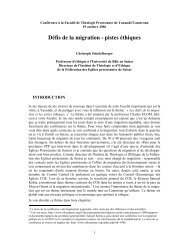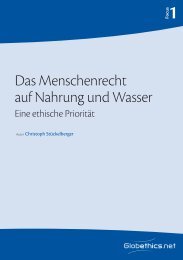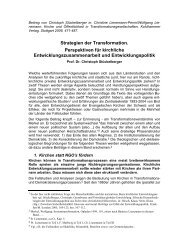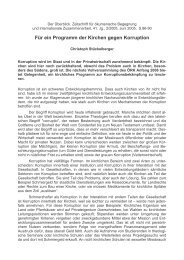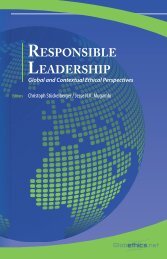BREAK THE CHAINS OF OPPRESION AND THE YOKE OF ...
BREAK THE CHAINS OF OPPRESION AND THE YOKE OF ...
BREAK THE CHAINS OF OPPRESION AND THE YOKE OF ...
You also want an ePaper? Increase the reach of your titles
YUMPU automatically turns print PDFs into web optimized ePapers that Google loves.
Definitions: Globalisation and Globalance<br />
In this position paper, globalisation is defined as an intensification of exchange<br />
and linkages between people and their values, cultures, capital, goods, services as<br />
well as institutions, states, organisations, sciences and religious groups. These<br />
linkages are complex in nature and often independent of location and time.<br />
They differ in quality and quantity as well as in regard to gender and class. Globalisation<br />
processes cross and transform political boundaries. As a consequence,<br />
multilateral political processes can lead to globally sustainable solutions of problems<br />
that go beyond the capacities of nation states.<br />
«Globalance» means a global development based on a balance of values such as<br />
«justice and freedom» which have to be kept together (see section Globalance as<br />
a Balance of Values below). Globalance aims to shape global relations in a balanced<br />
way, balancing the economic, political, social, cultural and religious aspects<br />
and its global, regional and local necessities.<br />
The Ecumenical Debate:<br />
A<br />
GLoB LAncE Common ground and Conflicts Since the Eight Assembly of the World Council<br />
of Churches in Harare in 1998, consensus has been reached in the ecumenical debate<br />
on globalisation on mainly four points. First, Christian faith has to shape and<br />
influence economic decisions by reflecting God’s love and justice. Second, human<br />
dignity, human rights and global justice have to be universal reference points for<br />
economically acting people. Third, the current economic globalisation processes<br />
have the potential to increase wealth, exchange and communication between people.<br />
Simultaneously, however, globalisation deepens injustice in many cases. There<br />
is urgent need that �they �are identified, � named and �overcome. � Fourth, although the<br />
analyses of economic globalisation differ among churches consensus has been<br />
reached and need to be further elaborated in future on many practical recommendations<br />
addressing churches and political and economic decision-makers.<br />
However, the ecumenical debate on globalisation is also struggling with conflicts.<br />
First, the World Alliance of Reformed Churches (WARC) yet not the<br />
World Council of Churches and not the Lutheran World Federation (LWF),<br />
called for a «processus confessionis» against the neo-liberal economic globalisation.<br />
Second, the view that globalisation is driven by new imperial powers and<br />
dominated by neo-liberal ideology is shared by statements of WCC, WARC and<br />
LWF. How to deal with this question is most controversial in the ecumenical debate.<br />
Third, the socio-economic situation of each church has an important impact<br />
on the way it articulates its position. In many countries, churches experience<br />
a minority position without having any influence on decision-makers. The<br />
cries of the powerless are voiced loudly. Churches in many developed countries<br />
articulate their position in a different way since their concerns often has an infl<br />
���������������������������������������������<br />
� � � � ��������������������<br />
�<br />
188<br />
– GLOBALANCE - CHRISTIAN PERSPECTIVES –



